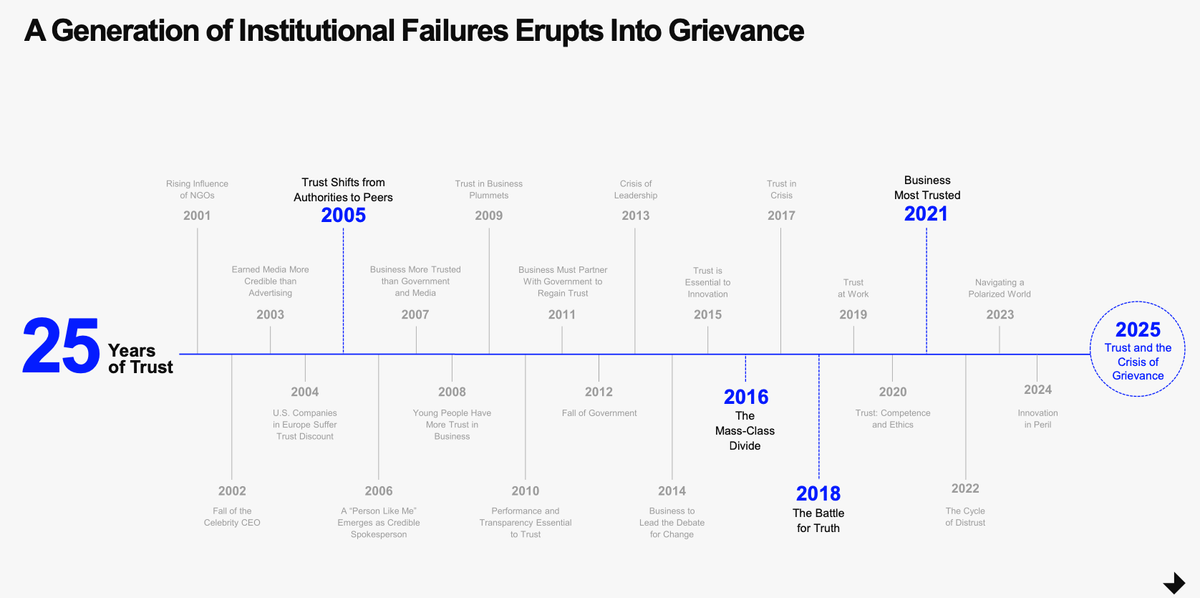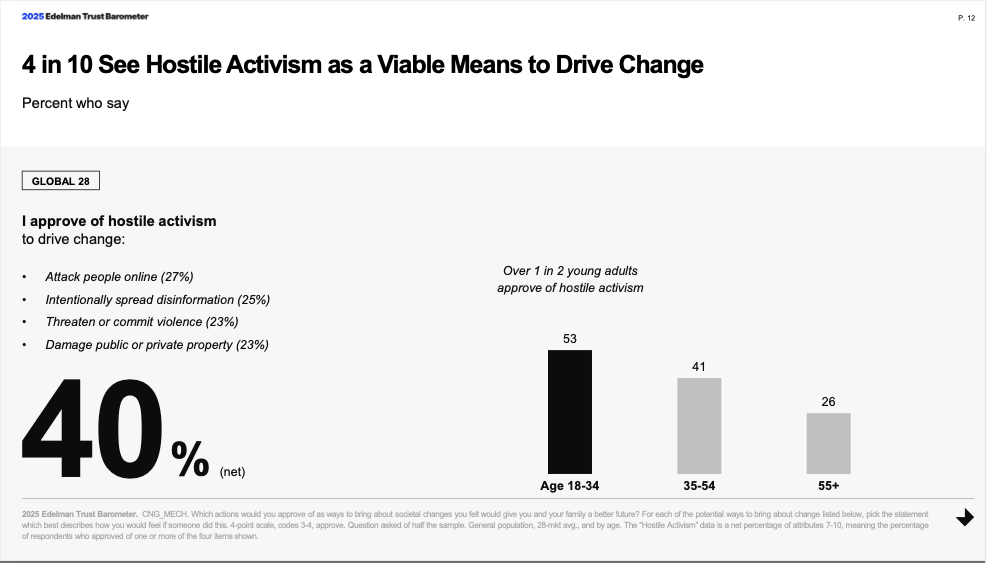Free Speech as Meme, Grievance as Weapon

Hey all!
Edelman’s Trust Barometer 2025 just came out, and it crystallized something I’ve been thinking about for a while. Instead of trying to time a newsletter around the never-ending series of dramatic events from the DOGE Administration, this is a post that is perhaps more about what led us to the institutional reckoning.
For those unfamiliar, each year global communications firm Edelman releases a survey about some facet of trust. “Crisis of Leadership,” or “Trust at Work”, that sort of thing. This year’s report, on the 25th anniversary of the project, was Trust and the Crisis of Grievance.
It will not surprise many people to learn that distrust is increasingly pervasive: two-thirds of respondents to Edelman’s survey expressed worry that journalists, CEOs, and government officials are intentionally lying to them. But what Edelman zeroes in on is intersection of grievance and (dis)trust. “Economic fears have metastasized into grievance,” Edelman argues. A whopping 61% of respondents admitted to a moderate or high sense of grievance; those who reported a higher degree of aggrievement were more distrustful of media, institutions, business, and government. Grievances stem from a conviction that the system is unfair: the wealthy benefit while regular people struggle.
These are not necessarily new sentiments. But the survey also revealed an alarming degree of approval of “hostile activism” as a means of response. It split the "activism" into four categories: attacking people online, intentionally spreading disinformation, threatening or committing violence, and damaging public property. Approval of hostile activism was particularly concentrated in people aged 18-34; anyone who has been on TikTok has encountered the Luigi memes.

Many of us who study social media have argued that the viral rumors and gladiatorial politics that grab our attention online aren’t a problem of facts. They indicate a crisis of trust: in institutions, in“official” narratives, and in each other. Anyone who's watched the proliferation of misinterpretations of government spending data on X this week, particularly around USAID, has seen it in action. These rumors don't just reflect distrust; they can actively fuel and amplify it. Suddenly, every prominent Elon orbiter is an expert critic of government spending – and their audiences are reacting not with healthy skepticism of the claims that are going viral, but with anger that they've been deceived about what USAID spends money on. They always knew there was something shady going on!
When we bemoan the loss of institutional trust—or more precisely, the erosion of trust—the discussion often assumes that a good-faith public is rationally reacting to institutional failures, with the solution being for institutions to take corrective action. Sometimes, this is true: institutions can be bureaucratic, incompetent, slow to respond, and/or poorly equipped to engage in the modern communication ecosystem. In these cases, improving transparency, responsiveness, and service delivery could help to restore trust. There are many things that government overspends on; we all want competent, efficient institutions.
But not all trust erosion is due to actual institutional wrongdoing. Grievances are frequently strategically exploited and amplified to appear far more significant than they are. Social media’s majority illusion worsens this: if it seems like everyone you follow or respect believes that something is irreparably broken, you may be inclined to believe it too. In these cases, trust isn’t degraded by institutional failure alone — it’s compounded via grievance manipulation, where small issues are inflated into existential crises.
Grievance functions differently than rational response to failure; it becomes entrenched and unyielding. Today, a proliferation of outrage merchants—in politics, media, and culture—thrive by monetizing the anger of their audiences. Even as institutions attempt to address their actual shortcomings, media issues a correction, or a government leader changes course, those who benefit from keeping discontent in constant focus continue to perpetuate the issue.
When grievance drives trust erosion, simply "doing better" isn't enough. Even minor incidents become fodder for the rage cycle. Grievances are distilled into simplistic, universally-recognizable memes: woke/anti-woke, fake news, elite. Free speech. These are phrases that reference serious concepts, or real and important values. But they’ve also become signifiers — keywords that, when applied to trivial matters, provide a familiar frame that makes the grievance instantly recognizable to an online crowd. Free speech as value, or legal principle, invites nuanced conversation. Free speech as meme becomes a tribal rallying cry, stripping the concept of its depth and rendering it almost unrecognizable.
The Edelman report covers just how deep and wide grievance runs in this moment. Many of the respondents report “a zero-sum mindset,” and believe that what helps people who don’t share their politics comes at a cost to them. Economic worries have deepened this alienation; a majority are convinced that “the wealthy take more than their fair share.” Only about a third of people believe that the next generation will be better off, with dismal rates in countries like Germany (14%) and France (9%). Many believe that prevailing political systems are broken.
In this environment trust degradation becomes an active, self-reinforcing cycle. Institutional reform is important, but breaking the cycle also demands strategic engagement with the narratives fueling public perception and exploiting grievance for influence. It requires confronting the forces keeping grievances alive and amplified.
But How?
As I was reading the report, I was headed to a conference of public relations professionals. They’d asked me to come speak about “communication in an age of discord and distrust.” I talked about the mechanics of online rumors, and went over some of the emerging best practices we’ve observed from election officials and others who are on the front lines of very hostile comms experiences. I discussed Hurricane Helene, and rumors about emergency workers… which we saw modified ever so slightly for Hurricane Milton, and then ever so slightly again for the Palisades wildfires. Each disaster provided an opportunity to castigate some agency or government official — often many, in quick succession — before the facts were even known.
No one seems to have an answer for what to do about this. I was hoping the PR folks would give me a playbook — after all, I look at things academically while they’re on the front lines making the calls. But no one had high confidence in any particular approach. I was surprised to learn that some viral rumors I think of as part of the moral outrage canon — like the Wayfair-sells-children debacle of 2020 — were not particularly well known to the audience. This disconnect between the “extremely online” world and the professional sphere is perhaps one reason why companies and institutions seem so blindsided by grievance-driven narratives that spread on social media, and why they often seem ill-prepared to respond.
Meanwhile, as I watched the USAID rage cycles play out on social media, it seemed like the misleading rage was taking up all the space - on X, for sure...very few Community Notes were showing up on even the craziest claims. Pathologically stupid theories about how the USAID and the CIA were revealed to have secretly been "behind" the Trump impeachment - thereby making it an "illegal regime change effort" not only made their way around the internet, but wound up on Fox News.
We are caught in a vicious cycle. Distrust fuels grievance, grievance erodes trust, and institutions struggle to maintain credibility in a media ecosystem where bad faith actors thrive by undermining it.
The challenge for institutions is twofold. They must address legitimate grievances through transparency and responsiveness. Government in particular must demonstrate its ability to deliver benefit to the people, and fix its abysmal comms practices. But institutions - including businesses - must develop resilience against grievance-driven narratives. Not every grievance merits a change in values or policy. Institutions must learn to distinguish between good-faith criticism and manipulated outrage. It's time to visibly push back against bad-faith attacks, rather than retreating or reacting defensively.
We need to collectively find ways to move away from the precipice of a grievance-driven society. Ultimately, Edelman’s report serves as a wake-up call to recognize grievance as a significant force that demands a new approach to building and maintaining trust.
In other news: I had the opportunity to co-host the Ctrl-Alt-Speech pod with Mike Masnick last week for a Very Special Episode: “This Episode Has Masculine Energy” (Mine.) We talked about Zuckerberg opting to settle Trump’s lawsuit over getting booted after January 6th – Meta would have won the case easily, but that would have been a problem for getting “brought into the tent," as Trump put it. So, Masculine Energy Mark's company capitulated and made a $25MM donation to Trump’s Presidential Library. In another country we might call that a "bribe." In this country, some might call it a beta move. Anyway, to keep up the masculine energy, we also covered some of the latest court filings and developments in the world of AI chatbots and talked to the Character.ai Giga Chad and Adonis bots. And I got to talk about the distinction between "free speech as meme" and free speech as law, or value.
Finally, if you're into wellness + weirdness, I joined Julian Walker for a Conspirituality "Brief" – a quick 30 min chat - to talk about the tech realignment. If fact checking is biased, content moderation is censorship, and combating foreign propaganda is anti-free speech, where does that leave us now?